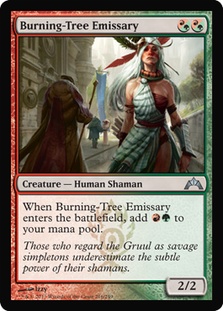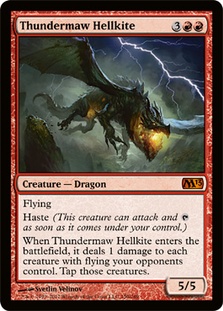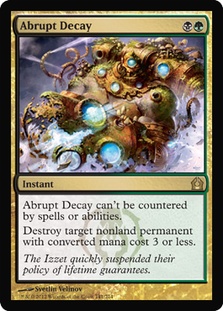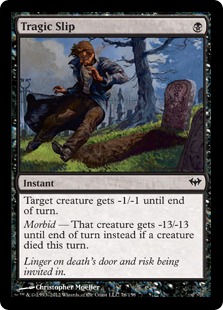(Warning: Ranting contained within. If you don’t care about my thoughts on GP Charlotte and the role of Grand Prix in general, search for "brewing" to bypass all of it.)
Much has been said already about Grand Prix Charlotte this past weekend. The nearly 2,700 players who descended on the event shattered all previous records. The turnout was absolutely unprecedented, with preregistration numbers alone outstripping the attendance of the average Grand Prix. It was by any objective metric a monumental success for Magic Organized Play.
Subjectively, however, my own experience at GP Charlotte was one of my least pleasant in recent memory. I opened a reasonable if unspectacular Sealed pool—you can watch my deckbuilding process and hear my thoughts on it here. The tournament suffered from massive delays due to the huge attendance. Round 4, the first round in which I played, didn’t start until after 5 PM. StarCityGames.com, the Tournament Organizer, did a great job of keeping people up to date with the timing situation, going as far as to post updates for the Sleep-In Special times on Twitter when they knew the event was going to be significantly delayed.
I’m used to tournaments running a bit behind, especially large ones, so this wasn’t a big concern in itself. What turned out to be a problem was the implication of all the delays. The hall the tournament was being held in had a hard deadline to close at 1 AM, which meant all players had to be out well before then to shut things down. The huge attendance number (and all of the byes) meant that the tournament formula demanded seventeen rounds of Swiss before Top 8, and there wasn’t enough time to run more than nine on Saturday before the hall closed.
The solution that the tournament staff came up with was to run those nine rounds on Day 1 and then come back on Sunday morning and play two more rounds of Sealed Deck before the two drafts. The problem with this is that they still needed to narrow the field down to make the drafts logistically feasible, so they ended up doing an additional cut after the first round on Sunday morning. The result was that anyone who went 7-2 on Day 1 ended up coming back to play a round of single elimination Sealed Deck on Sunday—at 8 AM, no less, since the tournament started early to ensure that all of the rounds could fit into the day.
I think you can guess what happened to me.
I actually started the tournament off with a loss and then took another shortly thereafter, putting me in sudden death mode very early on in the tournament. I managed to battle back to 7-2 to finish out the day and then decided to head to sleep immediately rather than get dinner since it was already midnight by the time Day 1 was over and we had to be back to start play at 8 AM the next day. I got out of bed at 6:30 the next day after getting far too little sleep, went to the tournament site, and split two close games, only to get mana screwed in game 3 and be out of the tournament.
Now, I’m generally not someone who gets upset about losing. I’ve played long enough and lost enough times that I’m pretty numb to the swings of fortune Magic can throw at me—hell, I’ve written articles about it! But after that match, I was absolutely furious. Not that I lost or even that I got unlucky, but that I was put in this ridiculous situation of waking up early in the morning to play a single match and then be cut from the tournament.
I understand that there was no easy solution to the problem, but that didn’t make me any less angry at the time. I can’t imagine how upset someone might have been who had made their very first Day 2 at a Grand Prix, only to get unceremoniously cut from the event after a single round. What about someone who had driven from an hour away or more who didn’t have the luxury of a nearby hotel room to crash in for the eight hours between the end of the last round on Saturday and the start of play on Sunday? What about the guy who drove with three of his buddies and had to make them come out early in the morning so he could play, only to be knocked out half an hour after they all showed up?
Honestly, I think StarCityGames.com did a great job with the tournament under the circumstances, but Magic is still going through serious growing pains when it comes to large-scale organized play. With the way tournament attendance keeps increasing, it won’t be too long before 2,000 player Grand Prix stop being outliers and become the norm. The attendance in Charlotte was clearly bolstered tremendously by the advertising and promotions StarCityGames.com used to get people to the event, but that doesn’t mean that we aren’t going to see numbers like this again. Organizers and tournament officials need to recognize that this kind of thing can and will happen and must devise plans to handle large events without resorting to putting players through incredibly unpleasant experiences like 8 AM single elimination matches.
Some ideas off the top of my head:
Earlier start time on Saturday.
Grand Prix have started at 10 AM on Saturday for a long time now, which is a major contributor to Day 1 running so late, especially for Limited events that have to deal with deck registration and deck construction. Day 1 could easily start at 9 AM, which would help speed up the end of day and avoid running into hall closing times with larger events.
Significant incentives for preregistration.
Saturday morning registration is a huge contributing factor in Day 1 delays. While many Grand Prix are now accepting preregistration, it’s still not the norm. Heavily encouraging preregistration would help alleviate Saturday morning registration delays as well as give organizers a better idea of how many players to expect at their events, which helps avoid other logistical holdups like setting up extra tables.
Actually enforce start times.
This one is something of a pet peeve of mine. At both Grand Prix Philadelphia last year and Grand Prix Charlotte last weekend, the schedule was changed to start early on Sunday to get the event finished on time. In both cases, players failed to show up by the scheduled start time, and in both cases the event was delayed to wait for them. We didn’t actually start play until 20+ minutes after the scheduled start time on each day, cutting into the time savings gained by the earlier start time dramatically. Yes, it sucks if you show up late and have to take a game loss as a result. However, it sucks for every other person in the tournament if they have to wait for you to show up and the tournament gets delayed. I’ve never once been late to a tournament start time in my years of competition. You shouldn’t be either.
Obviously, there are more logistical improvements that can be made, but these are literally the first few things I thought of that could help. What ideas do you have to improve large Magic events moving forward?
I really hate that I’m writing this so soon after my "The State of Pro Play" article because I hate to seem like I’m just complaining. Frankly, though, GP Charlotte embodied so much of what I feel is troubled in competitive Magic right now.
Quite a few people replied to my concerns in that article by saying that they really didn’t care about pro players coming to Grand Prix. Well, the hundreds upon hundreds of cards I signed this past weekend seem to suggest that there are certainly some players who do care. Even if you don’t care about meeting me, or Luis Scott-Vargas, or whoever, if you’re reading this there’s a good chance that you care about the possibility of one day being in our shoes as pro players. And if Grand Prix continue to grow and more of them look like GP Charlotte, I certainly hope they don’t remain as important as they are now in determining pro status. Of the 2,700 players in Charlotte, only 64 of them left any closer to going pro—and even most of those probably lost money doing it.
Grand Prix are currently torn between trying to serve a number of competing purposes. On one hand, they’re intended to be big Magic festivals, complete with a full array of artists, side events, and general good times for Magic players of all kinds. On the other, they’re professional tournaments intended to reward top players with the points necessary to reach the highest levels of the game.
For the former, huge events are great. A massive turnout creates an exciting atmosphere that people like being a part of. For the casual crowd, these events are special. For the pro crowd, though, Grand Prix kind of blur together because while the locations and the formats may change, the events are largely the same. A big event like Charlotte just means more rounds and less sleep. I think we would be better off making Grand Prix matter less in the scheme of pro play and focusing on them as big, cool events for the audience that’s really excited about them.
Anyway, no more ranting from me for a while. I feel like I’ve used up much of my quota for the year already. Besides, we’ve gotten to the point in the season where I’m barely traveling to an event for months! I’ll be going the SCG Open Series in Las Vegas this weekend, which I can drive to, and then GP San Diego in a few weeks, which is in my hometown, and then the next big event I’m likely to attend is GP Portland in May. I’m certainly looking forward to the break.
But that break doesn’t start for a few weeks, so I’ve been brewing! I played in the 10K on Sunday at GP Charlotte, where I finished 7-2 with EFro’s Naya deck before taking an intentional draw in the final round since I couldn’t make Top 8.
Creatures (28)
- 4 Hellrider
- 1 Thragtusk
- 3 Thundermaw Hellkite
- 4 Flinthoof Boar
- 4 Loxodon Smiter
- 4 Burning-Tree Emissary
- 4 Gyre Sage
- 4 Boros Reckoner
Planeswalkers (4)
Lands (24)
Spells (4)

The deck was fine but certainly didn’t seem particularly exciting to me. The most disappointing card by far was Burning-Tree Emissary. In almost every matchup I played, it was virtually useless since it was quickly outclassed by any creatures my opponent might play. Sure, the draws with multiple Emissaries and Flinthoof Boar felt powerful, but drawing an Emissary at any other point in the game was horrible. Emissary is great in decks that are putting serious pressure on the opponent and can leverage the extra body, but it just felt out of place with the rest of the deck here.
The other card that underperformed for me was Hellrider. Perhaps it was a matter of matchups since I played against a lot of other midrange decks, but Hellrider was consistently underwhelming. Like Emissary, it tended to match up poorly against opposing creatures by the time it hit the table. In a world full of Boros Reckoners, a four-cost 3/3 doesn’t seem like the best place to be. I’m sure it’s good against removal-heavy decks like Jund or Esper, where any solid haste creature is attractive, but in a field of aggressive and midrange decks, it was seriously unimpressive.
The thing that annoyed me most about the deck was how vulnerable it felt to opposing Reckoners. With so many ground creatures and only damage-based removal, an opposing Reckoner could easily put the brakes on any kind of offense I could muster. Thundermaw Hellkite was great for flying over ground stalls and of all the cards in the deck it probably overperformed the most, but I generally felt like I had to rely on my opponents making poor decisions with their Reckoners in order to actually break through them.
I feel like the core elements of this deck are very powerful, but I’m not sure how well they match up to what’s going on in the format right now. I feel like if I want to play some kind of aggressive deck, I want it to be one that lines up well against opposing Reckoners since I think they’re probably still going to be everywhere. This deck also doesn’t get on the board quite fast enough against some of the new hyperaggro decks like Naya Blitz—unless you have a Burning-Tree Emissary, which is horrible just about everywhere else. I decided I wanted to look for a deck that is better set up to fight off early offense that can also deal with Reckoner profitably—and I came back to old faithful.
Creatures (26)
- 4 Arbor Elf
- 4 Strangleroot Geist
- 4 Predator Ooze
- 3 Wolfir Avenger
- 3 Ulvenwald Tracker
- 4 Dreg Mangler
- 4 Lotleth Troll
Planeswalkers (2)
Lands (22)
Spells (10)

I tried out an updated version of the Ooze deck on Magic Online the other night, and I immediately won an eight-man queue. In that event, I faced Wolf Run Bant and two Naya Blitz decks. I was really happy with how effective the removal suite of Abrupt Decay and Tragic Slip was at keeping me alive through the initial creature rush until I could take over with something like Ooze/Tracker or Garruk.
I’m not entirely sure how this deck will stack up against the rest of the field, like Jund or Esper Control, but the fact that people are moving away from cards like Terminus in their control decks definitely gives me hope. I don’t know if a pair of Shamans and a Crypt is enough graveyard hate to combat the resurgence of Reanimator that we’ve seen lately. But the core of the deck is sufficiently aggressive that you can frequently force your opponent to go off very quickly, and many Reanimator decks have pretty high failure rates under that kind of pressure.
I don’t have much time left before I head out to Vegas, but I’m pretty sure this is close to what I’m going to sleeve up for that event. I had mostly abandoned Ooze before the Pro Tour because I was concerned about red decks with Rancor and Ghor-Clan Rampager trampling over my defensive creatures, but the Naya Blitz decks are far more vulnerable to the combination of resilient blockers and cheap removal than the R/G decks with Hellrider were. If people move more in that direction, I think Ooze may be where it’s at once again. We shall see.
That’s it for this week. Hopefully, I’ll be back next time with a tale of victory from SCG Open Series: Las Vegas!
Until then,
bmk





